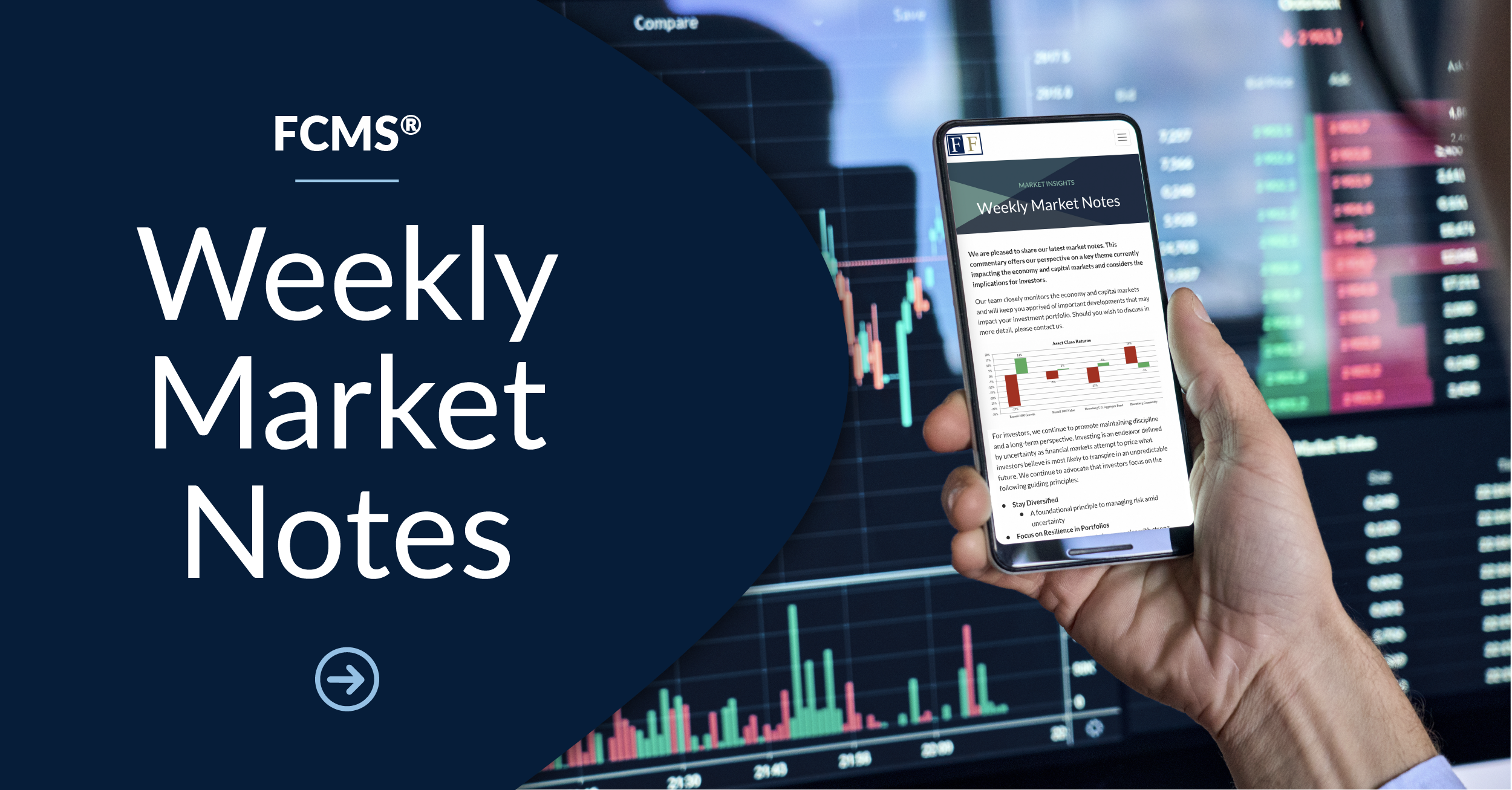Market Review
Stock Markets Continued to Rally Last Quarter While Bond Markets Encountered Some Headwinds
Stock market indices around the world had another strong quarter and extended their robust gains from 2023. Several major market indices, including the S&P 500 and Dow Jones Industrials Average in the U.S., the Stoxx 600 in Europe, and the Nikkei in Japan, achieved record highs during the quarter. U.S. stocks again proved standout performers with the S&P 500 rising more than 10% in Q1. However, there was a broadening of stocks participating in the rally during the quarter to include U.S. small company stocks and international stocks. This contrasts to the relatively narrow stock market gains for much of last year that were concentrated in a small group of large U.S. technology companies, popularly referred to as the Magnificent 7.
Bond markets, on the other hand, experienced a modest decline during the quarter and gave back some of the strong gains at the end of last year with the benchmark Bloomberg U.S. Aggregate Bond Index -0.8% in Q1.
What Drove These Financial Market Results and Why the Disconnect Between Stock and Bond Markets?
Stock markets were buoyed by continued strength in economic activity, especially in the U.S, where gross domestic product (GDP) expanded at a robust 3.4% annualized rate in Q4 2023 (Bureau of Economic Analysis). Further, most economic indicators continued to exceed expectations with the Citigroup Economic Surprise Index still firmly in positive territory. The strength in economic activity translated into strong corporate earnings last year and has led to rising expectations for company profit growth this year. Lastly, the recession fears that dominated the financial headlines a year ago have largely vanished amid the strength of the U.S. economy and growing confidence that the Federal Reserve (Fed) has achieved a soft landing – namely, taming inflation without tipping the economy into recession.
This economic strength did not translate to gains for bond market investors last quarter as fixed income markets experienced modest declines in response to rising interest rates. Interest rates rose in response to some hotter-than-anticipated U.S. inflation prints in Q1 and the aforementioned strength in economic activity raising the risk that inflation may remain elevated for longer than expected. Of note, bond markets are now expecting half the number of interest rate cuts from the Fed in 2024 compared to the beginning of the year; said simply, bond markets are now expecting interest rates to remain higher for longer.
In summary, strong economic growth trumped higher interest rates for stock markets, which experienced broad-based gains and saw several key indices globally surpass record levels in Q1. Bond markets, on the other hand, were tripped up by the higher interest rates that resulted from resilient economic activity and persistent inflation fears.
Investment Outlook
With So Much Positive Momentum, What Could Go Wrong?
Our near-term investment outlook is broadly constructive based on the continued strength of the U.S. economy and corporate earnings, signs of improving economic growth internationally, and the continued deceleration in the rate of inflation from the very elevated levels of recent years
With so much seemingly going right for the economy and stock market investors, what could go wrong? We believe there are three key factors investors should monitor for potential signs of risk to the goldilocks narrative that has seemingly taken hold in financial markets.
- Job Market – The job market in the U.S. has been a beacon of strength and resilience since the pandemic and remains so today with the unemployment rate at a multi-decade low and new job creation still strong. However, there are early signs from a variety of leading job market indicators, notably fewer job openings, declining quits rate, and falling temporary employment, that suggest the job market may be beginning to cool.
- Inflation – While inflation has slowed meaningfully from the very elevated levels of recent years, it remains stubbornly above the Fed’s 2% target. Further, as mentioned earlier, recent inflation readings have proven somewhat “hotter” than expected suggesting there still may be some bumps in the road before inflation is durably tamed and returns to target levels.
- Investor Expectations – Amid persistent strength in economic activity and robust gains in stock markets, it is not surprising that investor optimism has increased markedly over the past year. Rising optimism generally leads to higher expectations – said differently, the bar has been raised for the economy and markets going forward. With a lot of good news currently priced into stocks, there is less margin for error and the potential for unexpected negative news to have an outsized impact on asset prices.
Perspectives for Investors
There was much for investors to worry about as we entered 2024, especially geopolitically with the upcoming U.S. presidential election, ongoing wars in Ukraine and the Middle East, and continued tensions in the U.S.-China relationship. Despite the negative headlines, the economy continued to grow and stock prices continued to rise in Q1.
We continue to advocate discipline and encourage investors to stay focused on their long-term financial plans.
The past two years have provided a powerful lesson in the pitfalls of trying to time inherently unpredictable and volatile markets.
- Abandoning your long-term strategy to take undue risk at the beginning of 2022 for fear of missing out in reaction to the strong stock market gains and sense of euphoria in 2021 likely proved painful for investors as financial markets subsequently crashed in 2022.
- Conversely, investors who abandoned their long-term strategy at the beginning of 2023 in reaction to the pervasive market pessimism due the market crash of 2022 and widespread recession fears at the time likely have suffered significant long-term cost in missed opportunity.
It remains important that investors do not allow near-term geopolitical headlines to upend their long-term investment strategy. Time and again, geopolitical events, including U.S. presidential elections, have had unpredictable but fleeting impacts on financial markets, which are driven by fundamentals over the long term.
Lastly, diversification remains of critical importance for long-term investors who are seeking to build resilient portfolios that can weather inevitable economic turbulence and uncertainty and stand the test of time. We believe the case for diversification is the strongest it has been in some time as yields have risen and bonds offer a compelling complement to stocks for the first time in many years.
Discover more from the FCMS Investment Committee by subscribing to our Founders Insights blog and following us on LinkedIn.
Authored by the Freedom Capital Management Strategies® Investment Team
Securities and Investment Advisory Services offered through Founders Financial Securities, LLC. Member FINRA, SIPC and Registered Investment Advisor.
Securities and Investment Advisory Services offered through Founders Financial Securities, LLC. Member FINRA, SIPC and Registered Investment Advisor. This material contains the opinions of the author(s) but not necessarily those of Founders Financial Securities, LLC and such opinions are subject to change without notice. This material has been distributed for informational purposes only. Forecasts, estimates, and certain information contained herein are based upon proprietary research and should not be considered as investment advice or a recommendation of any particular security, strategy, or investment product. Information contained herein has been obtained from sources believed to be reliable but is not guaranteed. Investors should consult their financial, tax, and legal advisors before making investment decisions. Past performance results are no indication of future returns, and all investments may result in loss of principal.





